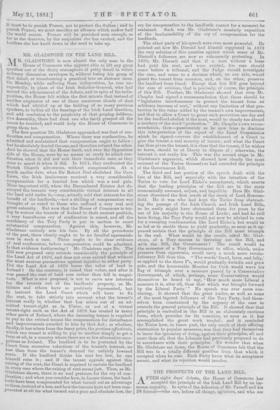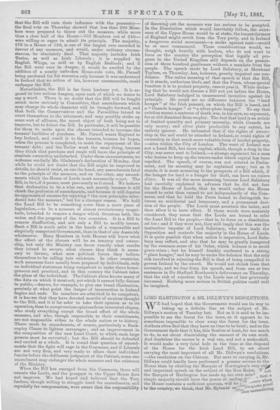THE PROSPECTS OF THE LAND BILL. A FTER eight days' debate,
the House of Commons has accepted the principle of the Irish Land Bill by an im- mense majority. In spite of the defection of Mr. Parnell and his 28 friends—who are, before all things, agitators, and who see
that the Bill will ruin their influence with the peasantry— the final vote on Thursday showed that less than 200 Mem- bers were prepared to throw out the measure, while more than a clear half of the House-352 Members out of 640— were willing or eager to admit its principle. The majority, 176 in a House of 528, is one of the largest ever recorded in favour of any measure, and would, under ordinary circum- stances, be absolutely final. That majority includes Irish Tories, as well as Irish Liberals ; it is supplied by English Whigs, as well as by English Radicals ; and if the Bill were ever in danger, it would be swelled by the addition of a nearly unbroken Home-rule vote, Mr. Parnell being pardoned for his secession only because it was understood in Ireland that no action of his, however unreasonable, could endanger the Bill.
Nevertheless, the Bill is far from harbour yet. It is ex- posed to two serious dangers, upon each of which we desire to say a word. There is no doubt that the Bill will be fought much more seriously in Committee, that amendments which may change its whole character will be brought forward, and that both the Conservatives and the Parnellites intend to exert themselves to the uttermost, and may possibly strike up some sort of alliance, the secret object of both being not to improve, but to defeat the Bill. In particular, it will be possible for them to unite upon the clauses intended to increase the tenants' facilities of purchase. Mr. Parnell wants England to buy Ireland, and resell it to the tenants, because he hopes, when the process is completed, to resist the repayment of the tenants' debt ; and the Tories want the same thing, because they think that purchase and resale will leave the principle of absolute ownership undisturbed. Under these circumstances, we welcome cordially Mr. Gladstone's declaration of Monday, that while he could not doubt that the Bill might be improved in details, he should resist, on one the hand, any amendments fatal to the principle of the measure, and on the other, any amend- ments which the House of Lords must necessarily reject. The Bill, in fact, if it passes, must pass nearly as it stood. We believe that declaration to be a wise one, not merely because it will cheek the profusion of amendments, and because it will deprive its opponents of excuses for rejecting " the new principles intro- duced into the measure," but for a stronger reason. We hold the Land Bill to be something more than a mere piece of legislation,---to be a measure of almost revolutionary magni- tude, intended to remove a danger which threatens both the union and the progress of the two countries. It is a Bill to remove disaffection, and not only a Bill to modify tenure. Such a Bill is much safer in the hands of a responsible and singularly competent Government, than in that of any Assembly whatsoever. Many Members in both Houses will know what the effect of the clauses will be on tenancy and owner- ship, but only the Ministry can know exactly what results they intend to secure, what classes they think it neces- sary to favour, what new political forces they believe themselves to be calling into existence. In other countries, such measures have usually been prepared by individuals, only an individual statesman being competent to make them homo- geneous and practical, and in this country the Cabinet takes the place of the individual. The Cabinet alone knows many of the data on which it must act, yet which it cannot fully discuss in public,—knows, for example, to give one broad illustration, precisely at what point the danger of insurrection in Ireland begins and ends. Its members are admitted to be competent, it is known that they have devoted months of anxious thought to the Bill, and it is far safer to take their opinion as to its operation, than to accept various opinions from interested cliques, who study everything except the broad effect of the whole measure, and who, though responsible to their constituents, are not responsible either to the whole nation or to history. There must be amendments, of course, particularly a Bank- ruptcy Clause to lighten arrearages ; and an improvement in the composition of the new Land Court, to which such large powers must be entrusted ; but the Bill should be defended and carried as a whole. It is round that question of amend- ments that the fight will rage in the Commons, and if Liberals are not very firm, and very ready to efface their individual fancies before the deliberate judgment of the Cabinet, some one amendment may endanger the whole measure and the existence of the Ministry.
When the Bill has emerged from the Commons, there will 'remain the Lords, and the prospect in the Upper House does not improve. We had hoped and believed that the Tory leaders, though willing to struggle hard for amendments, and espeoially for compensation, were aware that the responsibility of throwing out the measure was too serious to be accepted. In the Dissolution which would inevitably follow, the exist- ence of the Upper House would be at stake, the tenant-farmers of England might revolt from the Tory party, and in Ireland a dangerous social movement—a strike against rent—would be at once commenced. These considerations would, we thought, weigh heavily with leaders, who do not want to force on the country the perception that legally all pro- gress in the United Kingdom still depends on the permis- sion of three hundred gentlemen without a mandate from the people. The speech made by Lord Salisbury, at Merchant Taylors, on Thursday, has, however, greatly impaired our con- fidence. The entire meaning of that speech is that the Bill, as it stands, authorises theft, and that the Peers, whose special function it is to protect property, cannot pass it. While declar- ing that he would not discuss a Bill not yet before the House, Lord Salisbury indulged in unmeasured invective against its principle. He could see no difference between the "land hunger" of the Irish peasant, on which the Bill is based, and a " Consols hunger " or " a silver-plate hunger." To say that eviction meant a sentence of death was, in his eyes, no argument, for so did dismissal from employ. The fact that land is an article of limited quantity and primary necessity, while Consols are only money, and silver plate producible to any extent, he entirely ignores. He intimated that if the rights of owner- ship in the soil could be attacked in Ireland, so could rights of ownership in that much more valuable form of landed property, —sites within the City of London. The want of Ireland was not a Land Bill, but more capital, which, though a drug in the City, was never sent to Ireland,—a strange argument for a man who desires to keep up the tenure under which capital has been repelled. Tho speech, of course, was not uttered in Parlia- ment, and its meaning may be explained away ; but as it stands, it is most menacing to the prospects of a Bill which, if the hunger for land is a hunger for theft, can have no raison d'être. It was all the more menacing, because Lord Salisbury had carefully explained in advance that he did not fear for the House of Lords, that he would rather the House ceased to exist than ceased to act independently of the Com- mons, and that he held the Peers bound to distinguish be- tween an accidental and temporary, and a permanent deci- sion of the people. The Lords must ascertain the latter, and then allow it to have effect. If those words wore maturely considered, they mean that the Lords are bound to refer the Land Bill to the people,—that is, to force on a dissolution ad hoc; aid if they were not, they still imply that this was the instinctive impulse of Lord Salisbury, who now leads the Opposition and controls the majority in the House of Lords. It is quite possible that when action is imperative, Lord Salis- bury may reflect, and also that he may be greatly hampered by the common-sense of his Order, which induces it to avoid grave crises ; but he himself frankly confessed to a strong " place hunger," and he may be under the delusion that the only risk involved in rejecting the Bill is that of being compelled to govern Ireland by the sword. He would not shrink from that necessity, and we fear from his speech, and from one or two sentences in Sir Stafford Northcote's deliverance on Thursday, that the risk of rejection by the Lords has of late grievously increased. Nothing more serious in British polities could well be imagined.



































 Previous page
Previous page